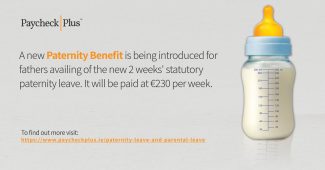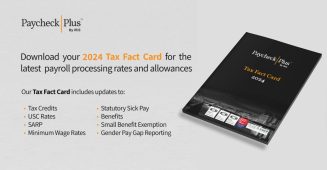New changes to parental leave
As of September 1st 2019, the Parental Leave Act has introduced some new changes:
- An extension to the number of week’s parents can take. Previously, parents could take 18 weeks parental leave under the Parental Leave (Amendment) Act 2019. As of September 1ST 2019, this has increased to 22 weeks.
- A further 4 weeks is to be added from September 1st 2020 bringing the total to 26 weeks.
- An increase from 8 to 12 years of age of the child that parents can take leave for. (Further information can be found below)
Parental Leave now allows the parent of a child, born or adopted, to take unpaid leave for 22 weeks (as of September 2019)
Age of child
Leave can be taken up until the child’s 12th birthday. If a child is adopted nearing 12 years of age, parental leave can be taken up to two years after the adoption order date. In the case of a child with a disability or a long-term illness leave may be taken up to 16 years of age. In addition, an extension may also be allowed where illness or other incapacity prevented the employee taking the leave within the normal period.
Amount of parental leave
Where an employee has more than one child, parental leave is limited to 22 weeks in a 12-month period. This can be longer if the employer agrees. Parents of twins or triplets can take more than 22 weeks of parental leave in a year.
Both parents have an equal separate entitlement to parental leave. Unless you and your partner work for the same employer, you can only claim your own parental leave entitlement. If you both work for the same employer and your employer agrees you may transfer 14 weeks of your parental leave entitlement to each other.
If the parent becomes ill while on parental leave and is unable to care for the child the leave can be suspended for the duration of the illness.
Employment rights while on parental leave
You are not entitled to pay from your employer while you are on parental leave nor are you entitled to any social welfare payment equivalent to Maternity Benefit or Adoptive Benefit.
However, taking parental leave does not affect other employment rights you have. Apart from the loss of pay and pension contributions, your position remains as if no parental leave had been taken. This means, for example, that time spent on parental leave can be used to accumulate your annual leave entitlement.
If your annual holidays fall during parental leave, they may be taken at a later time. You are entitled to any public holidays that occurs while you are on parental leave. Your public holiday entitlement can be added to the end of your parental leave.
How to apply
You must give written notice to your employer of your intention to take parental leave. You should inform your employer in writing at least 6 weeks before the leave is due to start. The notice should state the starting date and how long the leave will last. After this not less than 4 weeks before the leave is due to start, you will need to sign a document with your employer confirming the details of the leave.
If your employee has requested parental leave and you are not sure what steps you need to take why not let our experts handle your payroll and implement changes like these with ease.
To ensure payroll accuracy or for more information on our payroll services simply request a callback now or call our office on 041 9892100. Alternatively, request a quote here.
For More on Maternity and Parental Leave Changes Read
Paycheck Plus, Your Payroll Outsourcing Partner
Managing payroll is a complex and time-consuming operation. Keeping up to date with ever evolving legislative changes, ensuring payroll compliance and delivering employee wages accurately and on time takes its toll on a business’ senior resources. Here at Paycheck Plus, we’ve been providing comprehensive payroll services tailored specifically to each of our client’s needs for over a decade. Our payroll specialists handle all aspects of payroll management for our clients including answering our client’s employee queries through our Employee Assist Helpline.


